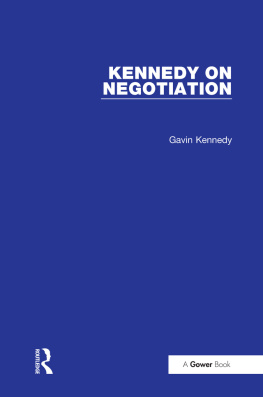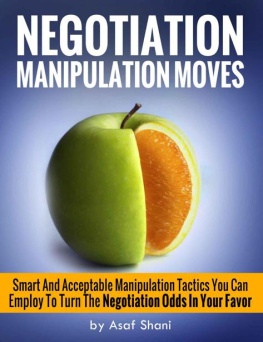Horacio Falcao - Value Negotiation: How to Finally Get the Win-Win Right
Here you can read online Horacio Falcao - Value Negotiation: How to Finally Get the Win-Win Right full text of the book (entire story) in english for free. Download pdf and epub, get meaning, cover and reviews about this ebook. year: 2012, publisher: Pearson Education, genre: Children. Description of the work, (preface) as well as reviews are available. Best literature library LitArk.com created for fans of good reading and offers a wide selection of genres:
Romance novel
Science fiction
Adventure
Detective
Science
History
Home and family
Prose
Art
Politics
Computer
Non-fiction
Religion
Business
Children
Humor
Choose a favorite category and find really read worthwhile books. Enjoy immersion in the world of imagination, feel the emotions of the characters or learn something new for yourself, make an fascinating discovery.

- Book:Value Negotiation: How to Finally Get the Win-Win Right
- Author:
- Publisher:Pearson Education
- Genre:
- Year:2012
- Rating:5 / 5
- Favourites:Add to favourites
- Your mark:
- 100
- 1
- 2
- 3
- 4
- 5
Value Negotiation: How to Finally Get the Win-Win Right: summary, description and annotation
We offer to read an annotation, description, summary or preface (depends on what the author of the book "Value Negotiation: How to Finally Get the Win-Win Right" wrote himself). If you haven't found the necessary information about the book — write in the comments, we will try to find it.
Value Negotiation: How to Finally Get the Win-Win Right — read online for free the complete book (whole text) full work
Below is the text of the book, divided by pages. System saving the place of the last page read, allows you to conveniently read the book "Value Negotiation: How to Finally Get the Win-Win Right" online for free, without having to search again every time where you left off. Put a bookmark, and you can go to the page where you finished reading at any time.
Font size:
Interval:
Bookmark:
How to Finally Get the Win-Win Right
Horacio Falco
INSEAD
Prentice Hall
Singapore London New York Toronto Sydney Tokyo Madrid
Mexico City Munich Paris Capetown Hong Kong Montreal
Published in 2010 by
Prentice Hall
Pearson Education South Asia Pte Ltd
23/25 First Lok Yang Road, Jurong
Singapore 629733
Pearson Education offices in Asia: Bangkok, Beijing, Hong Kong, Jakarta, Kuala Lumpur, Manila, New Delhi, Seoul, Singapore, Taipei, Tokyo Printed in Singapore
4 3 2 1
13 12 11 10
ISBN 13 978-981-8143-2
ISBN 10 981-06-8143-7
Copyright 2010 by Pearson Education South Asia. All rights reserved. This publication is protected by copyright and permission should be obtained from the publisher prior to any prohibited reproduction, storage in a retrieval system, or transmission in any form or by any means, electronic, mechanical, photocopying, recording, or likewise. For information regarding permission(s), write to: Rights and Permissions Department.

www.pearsoned-asia.com
To Camila, Luca and Mateus
The three most fun, enriching and loving negotiations of my life. That our lives together continue to be the most meaningful value we can exchange.
Not knowing how to negotiate is no longer an option for anyone. On a daily basis, negotiating is a way to succeed and survive. Ranging from dealing with an apartment landlord to thinking about how to ask for a pay raise to dealing with clients to introducing a new product in the market to merging multinational corporations to settling a border dispute among two nations, it is all about the same objective finding the way forward.
To succeed, we all need a set of basic communication tools that can help us get to where we want to go. In this book, Horacio Falco illustrates how to put these tools to use and, therefore, how to thrive. Throughout his book, Falco writes with the great talent that he has successfully applied to complex negotiations and training sessions through the years. He honed his skills while working with governments, corporations and international institutions and organizations, and is now one of the most successful negotiators in the field.
These were the inherent qualities that Horacio displayed when he came to work for me as my first employee fresh out of Harvard Law School than a dozen years ago. The techniques he takes to the next level in this book are the ones I myself have used in part to facilitate multinational transactions, including projects that involved working with international energy corporations, finding new business opportunities worth millions of dollars and working with governments.
The processes elaborated in this book were particularly pivotal in resolving a border dispute between Peru and Ecuador that had been languishing for 53 years. To finally usher in a peaceful settlement between Peru and Ecuador, our team focused on identifying the common interests of their governments, including discussing the millions of dollars in defense spending as a result of the tensions between the two countries. We then brainstormed on how a resolution of the conflict would unlock the support of international organizations that would invest in each country. To come to terms, we were thus able to bring the parties to question the most fundamental assumptions that had kept the two nations apart for more than five decades.
Central to this book is that negotiating is a process that creates and finds value, and gets individuals as much of what they want as is possible in a realistic world. Yet deep within, where nuances and subtleties combine at times to make a situation far different than it first appears, negotiations can also change the reality so that new areas of agreement are possible. A good negotiator will have studied the areas of concern and aims to leave all parties open to new possibilities. The objective is to turn a possible competitive situation into a collaborative effort in which value can be created.
From the start, parties share their interests with each other, and in reacting to those interests, we begin to understand, create value, and move forward toward an agreement. Understanding the interests of all involved is at the core of successful negotiations. A negotiator must ask, Are we looking at this from every angle? If one is not fully aware of the interests of the other party, one cannot possibly know what might satisfy that person or understand the lines beyond which someone will not go.
At any point in life successful negotiations can be highly rewarding. They can culminate in a situation in which everyone wins, often through personal growth. Being creative and resourceful, negotiators can give rise to so much. They can bring into being new atmospheres for progress. They can generate hope. They can leverage personal power to raise the creative capacities of individuals in constructive ways. In doing so, those engaged in negotiations also become more aware of their surroundings.
However complicated and competitive the world might have become in our lifetimes and regardless of how more extraordinary the times ahead might surprise us, these techniques can help improve the conditions around us. Well-executed negotiations can make for a better future. This is the promise of improving your negotiation skills. You can do good and do well! You owe it to yourself and to those with whom you will interact to be the best negotiator you can be. Get started today. In so doing, you help yourself to be a better person and make the world a better place.
Francisco Sanchez
Former Special Assistant to the President of the United States &
Former US Assistant Secretary of Transportation
In 1984, Roger Fisher and William Ury published Getting to Yes (GTY) and started a negotiation thinking and practice revolution. For the first time, the basic win-win process ideas were laid out for the common person. The book defined a common terminology that allowed many to dive into the field with much interest and care.
Since then negotiation became a mainstream course in all respectable law or business schools around the world. Naturally many articles and books followed by numerous negotiators and academics. As expected, not even Fisher or Urys later texts aligned themselves 100% behind GTY, since their thinking about negotiation also evolved. Nevertheless, for the past 35 years, many new ideas on win-win and other approaches to negotiation were produced.
As new articles and books came along, a lot of ideas were either building up or correcting the original GTY theory. As academics, we do have a mission of helping the world to become a better place through knowledge. Our negotiation knowledge is built for the betterment of society and human relationships through value creation and superior conflict management. And indeed, negotiation academics are working really hard in generating new ideas to improve negotiation on a daily basis. So what is the problem?
The field of negotiation is already starting to get too broad and complicated for those who devote ourselves to studying it. What to say of the normal businessperson, lawyer or politician who negotiates everyday? How can they take the time to understand the connections and trade-offs of all different negotiation advices? How can they read over 50 books and twice as many articles to improve their negotiation effectiveness? The answer is they cannot. We, academics, are starting to build our negotiation ivory tower and isolating ourselves from the world.
Font size:
Interval:
Bookmark:
Similar books «Value Negotiation: How to Finally Get the Win-Win Right»
Look at similar books to Value Negotiation: How to Finally Get the Win-Win Right. We have selected literature similar in name and meaning in the hope of providing readers with more options to find new, interesting, not yet read works.
Discussion, reviews of the book Value Negotiation: How to Finally Get the Win-Win Right and just readers' own opinions. Leave your comments, write what you think about the work, its meaning or the main characters. Specify what exactly you liked and what you didn't like, and why you think so.










